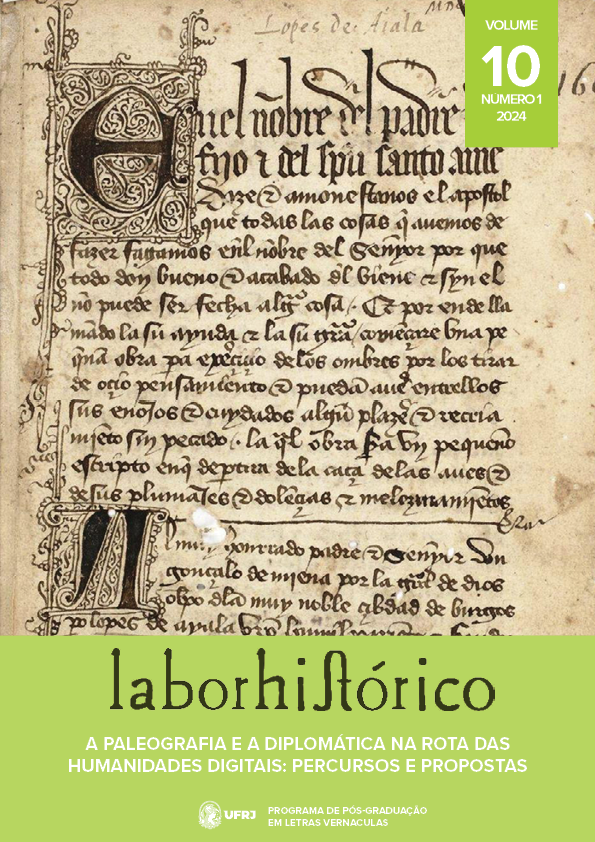História, fontes documentais e futuro: utilização da diplomática para a análise da documentação digital contemporânea
DOI:
https://doi.org/10.24206/lh.v10i1.63284Palavras-chave:
Archival science, diplomatics, documentary sources, electronic documents, genuineness.Resumo
Este estudo aborda o tema da utilização próxima ou iminente, como fontes de investigação histórica, de documentos digitais que, nos últimos anos, se têm instalado cada vez mais nos arquivos produzidos por indivíduos ou organizações. Relativamente a esta utilização, é essencial poder avaliar a autenticidade da documentação digital utilizada como fonte histórica, devido a algumas diferenças relevantes existentes entre o documento analógico tradicional e o digital. Este ensaio explora o papel primordial que a diplomática pode desempenhar apenas na identificação de soluções para a verificação da autenticidade em ambiente digital, partindo das suas mais recentes correntes de pensamento e investigação. No âmbito do estudo do documento digital, a disciplina está a ser moldada como uma “disciplina de fronteira” que incorpora contribuições de outras ciências e, como tal, parece ser capaz de elaborar uma visão geral do documento digital que se distancia das visões principalmente parciais até agora desenvolvidas por outras ciências.
Referências
ALFIER, Alessandro (2018). La descrizione archivistica all’interno di sistemi complessi. In Descrivere gli archivi al tempo di RIC-CM. Macerata: EUM. P. 45-80.
ALFIER, Alessandro (2020). Il sistema di documentazione digitale. Milan: Editrice Bibliografica.
BRENNEKE, Adolf (1968). Archivistica. Contributo alla teoria e alla storia archivistica europea. Milan: Giuffrè.
CARUCCI, Paola (2000). Le fonti archivistiche: ordinamento e conservazione. Rome: Carocci.
DURANTI, Luciana (1989). Diplomatics: New Uses for an Old Science. Part I. In Archivaria. Vol. 28, p. 7-27.
DURANTI, Luciana (2006). Verso una teoria archivistica di conservazione digitale: i risultati concettuali del progetto InterPARES. In Archivi. Vol. 1, no. 1, pages 75-97.
DURANTI, Luciana; PRESTON, Randy (2008). International Research on Permanent Authentic Records in Electronic Systems (InterPARES) 2. Experiential, Interactive and Dynamic Records (Archivi. Vol. 3, no. 2). Padua: Cleup.
FERRARIS, Maurizio (2010). Documentalità. Perché è necessario lasciar tracce. Bari: Laterza.
INTERPARES (2001). Authenticity Task Force Report [Online]. [Consult. 3rd September 2021]. Available at: http://www.interpares.org/book/interpares_book_d_part1.pdf
INTERPARES (2002). Requirements for Assessing and Maintaining the Authenticity of Electronic Records [Online]. [Consult. 3rd September 2021]. Available at www.interpares.org/display_file.cfm?doc=ip1_authenticity_requirements.pdf
INTERPARES (2021). The InterPARES 2 Project Glossary [Online]. [Consult. 3rd September 2021]. Available at www.interpares.org/ip2/display_file.cfm?doc=ip2_glossary.pdf&CFID= 23827419&CFTOKEN=68074790
LODOLINI, Elio (2000). Archivistica. Principi e problemi. Milan: Franco Angeli, 2000 9
NICOLAJ, Giovanna (1986). Sentieri di diplomatica. In Archivio storico italiano. Vol. 144, no. 3, p. 305-331.
NICOLAJ, Giovanna (1998). Fratture e continuità nella documentazione fra tardo antico e alto medioevo. Preliminari di diplomatica e questioni di metodo. In Morfologie sociali e culturali in Europa fra tarda antichità e alto medioevo. Spoleto: Centro italiano di studi sull’Alto medioevo. p. 953-984.
NICOLAJ, Giovanna (2007). Lezioni di diplomatica generale. I Istituzioni. Rome: Bulzoni.
PETRUCCI, Armando (1963. Diplomatica vecchia e nuova. Studi medievali. Vol. 4, no. 2, p. 785-798.
Downloads
Publicado
Edição
Seção
Licença
Copyright (c) 2024 Alessandro Alfier

Este trabalho está licenciado sob uma licença Creative Commons Attribution-NonCommercial 4.0 International License.
Os autores que publicam nesta revista concordam com o seguinte:
a. Os autores detêm os direitos autorais dos artigos publicados; os autores são os únicos responsáveis pelo conteúdo dos trabalhos publicados; o trabalho publicado está licenciado sob uma Licença Creative Commons Atribuição-NãoComercial 4.0 Internacional, que permite o compartilhamento da publicação desde que haja o reconhecimento de autoria e da publicação pela Revista LaborHistórico.
b. Em caso de uma segunda publicação, é obrigatório reconhecer a primeira publicação da Revista LaborHistórico.
c. Os autores podem publicar e distribuir seus trabalhos (por exemplo, em repositórios institucionais, sites e perfis pessoais) a qualquer momento, após o processo editorial da Revista LaborHistórico.


